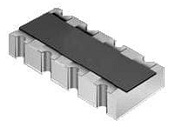Resistors Networks
RG Allen Resistors Networks:
 RA Allen Thick film resistor networks have a Metal Glaze Element on the ceramic substrates with strong clip construction terminal, and are coated with special epoxy resin. They are the most suitable to meet the density of circuit assembling.
RA Allen Thick film resistor networks have a Metal Glaze Element on the ceramic substrates with strong clip construction terminal, and are coated with special epoxy resin. They are the most suitable to meet the density of circuit assembling.
Application
• Control Circuits of V.C.R. Computer, Facsimile, Car & Air-Conditioner.
• Color T.V. & Other Electronic equipment for Consumer use.
Features
• Miniature, High Density Packaging.
• Combinations of Different Ohmic values are available.
• High Reliability with RUO2 Paste
A resistor network is a combination of several resistors that are configured into a pattern. Although most resistor networks use resistors that are connected in series, some resistor networks use resistors in parallel or series-parallel configurations. The resistors in a network act as voltage dividers which divide the voltage that is applied to a circuit into smaller amounts.
Available in a variety of package configurations, containing as many as 48 resistors and 64 contacts with densities up to 750 resistors/square inch, they are well-suited for memory and logic circuits in PCI and LVPECL cards, FPGA I/O terminations, and high density connector/backplane interfaces.
Resistor networks and RC terminations are low-cost resistor solutions for standard and custom circuit topologies including isolated and various bussed configurations.
 NL, NH Resistor Networks
NL, NH Resistor Networks
TLN Resistor Ladder Networks
CRN Capacitor/Resistor Networks
Applications for Resistor Networks & Arrays:
Resistor networks are widely used in electronic applications. Resistor networks can be found in several applications:
- Analog-to-digital conversion
- Digital-to-analog conversion
- Voltage dividers for power functions
- Terminal for SDRAM and DDRAM
- Computer applications
- Consumer electronics
Capacitor Resistor Networks
Capacitor Resistor Networks are devices that contain a number of resistor-capacitor circuit elements. They are used in applications that require filtering and are commonly utilized as electro-magnetic interference (EMI) filters, electro-static discharge (ESD) protection, bus termination and suppressor/snubber circuits. Typical applications include automotive noise suppression, I/O port protection, radio frequency interference (RFI) suppression, power supply filtering and memory interface termination.What are resistor capacitors made of?
To store surge voltages and current energy and afford protection against inductively induced potentials, resistor capacitors Networks are:
- Made from dielectric material providing a high degree of voltage withstand strength
- Non-inductive types to ensure a high degree of protection against pulse potentials
- Packaged in cases, which meet the flammability requirements


